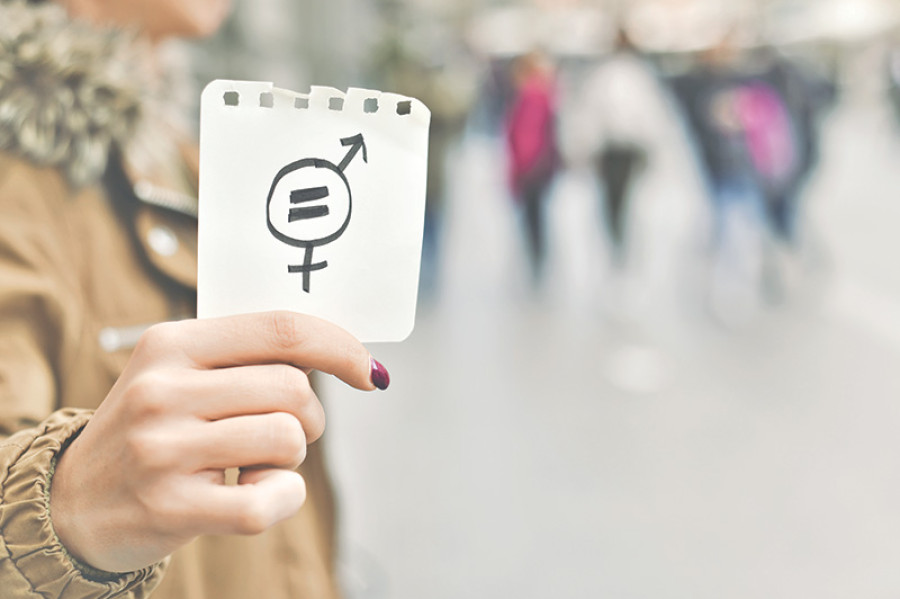Opinion
He for she
Men too have a responsibility in ensuring gender equality in every field
Dr Prakash Banjade
Enter 2019, but we are still talking about attaining gender equality. This conversation continues because for the longest time, the onus was on women to make this possible. Not anymore. If we want to balance the equation better, everyone must take responsibility for it. Meaning, the men are equally responsible in ensuring women are represented better, not discriminated against and as a corollary, treated with the respect they deserve. The UN General Assembly as an international bill of rights adopted the Convention of the Elimination of All forms of Discrimination against Women (CEDAW) in 1979 for women. It defines what constitutes discrimination against women and a commitment for national action to end such discrimination (UN Women 2009). Although Nepal is a party to the convention, a majority of women continue to face discrimination based on caste and gender in social, economic and political grounds.
There is no doubt that ours is a highly patriarchal society. On almost every measure, women are worse off than men. Global Gender Index ranked Nepal 110th out of 144 countries for gender parity. When we see the social inclusion index, women are lagging behind in educational dimension Index, Health Dimension index and Social Dimension Index, Economic Dimension Index. Women are further disadvantaged economically and socially because they often receive approximately half the years of schooling as compared to men and have less access to health care services and fewer legal rights. They are not considered or given opportunity to complete their higher studies. Seldom do they get to exercise their agency when it comes to decisions about marriage. Even worse, most girls are forced into marriage as soon as they reach the legal age.
Women’s access to and control over resources, benefits, and opportunities, including land, assets, credit, training, and household income too is often limited. Globally women earn less than men for the same work. Their jobs are concentrated in lower paying industries and the informal sector. And Nepal is no exception. Women need proper qualification and political knowledge to ensure their participation. Gender equality cannot be achieved without the involvement of men. Therefore, raising awareness programmes among men and the communities could prove instrumental in minimising negative stereotypes and building equal relationship between both the genders. Likewise, different political parties promoting gender equality in the country should adopt effective policies within their own organisations too.
Although equality for men and women are legally provided for both, women in Nepal are socially accorded a lower status. They have to rely on reservation system for the opportunities in public, private and other sectors like, government level, politics and employment. The unequal distribution of wages, disproportional data in political participation and low-level position in public and private institutions are the main examples of gender disparity in Nepal.
National policies affect both male and female. Hence, every political parties and leader need to realise that there should be equal participation of both genders when it comes to policy formulation. Often women’s contributions and recommendation are dismissed and taken lightly owing to their gender. But it is not gender that informs knowledge about a certain topic. Rather, it is about how much time that person has invested in knowing about it that should determine things.
The Constitution of Nepal 2015 has come a long way. Article 43 deals with the rights of women that include rights to lineage, right to safe maternity and reproduction, right against all forms of exploitation, and equal rights in family matters and property. The Government of Nepal is also working to incorporate gender equality in all development policies and programmes, including developing a gender responsive budget system. And crimilaising Chhaupadi was a milestone too.
While in the early phase, women’s movements were focused on equality often expressed in abstract form, in the recent years such movements have been directed towards gender mainstreaming by expanding political and economic space for women. On the legal front too some remarkable improvements have been made. For instance, the ‘Civil Code’ (Muluki Ain) states that daughters also will have equal access to their parents’ property. Even in case of a divorce, women will be entitled to the property proportionately as men.
Albiet still less in number as compared to men, but some women have blazed a trail in various fields—from politics, to science and technology, sports, arts, academics and so on. However, these women and their achievements are exceptions, not the norm. While we celebrate these women, let’s keep uplifting other women who have not had the opportunity to shine until now. Discrimination against women and girls is a pervasive and long-running phenomenon that has long been characterising the Nepali society. But since we made it a feature of our society, only we can change that and create greater balance between the genders in all fields. It should not be that difficult.
Banjade is a doctor




 21.45°C Kathmandu
21.45°C Kathmandu










